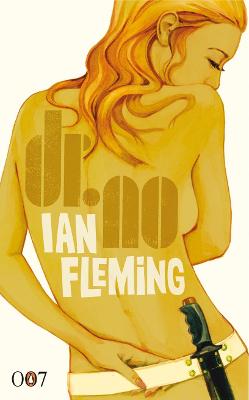
brokentune
Written on Aug 25, 2016
‘First of all, what do you think of the Beretta, the .25?’
‘Ladies’ gun, sir.’ M. raised ironic eyebrows at Bond.
Bond smiled thinly.
What fun!
After the last installment of Bond had left me filled with rage for a while, this one was quite a surprise. There is less politicking in this one. Without much concern for with the Cold War as such, this adventure turns to the mysterious Dr. No.
In a way, Dr. No seems to be a break with the previous books:
Bond enters book the having only just recovered from his previous mission, which did not end as planned. Filled with doubt and feeling he needed to justify his 00-status to M, Bond seems somewhat humbled. To aid his recovery, M sends Bond to Jamaica to investigate the seemingly trivial matter of the disappearance of a few people - two diplomats, and two members of the Audobon Society.
And this is where the glorious wackiness of this novel start. Yes, this Bond adventure is based on the topic of birds - bird watching and guano mining.
The mere idea of it had me in stitches. I mean Bond and birds (of the feathered kind)?
All through the book, I was wondering if Fleming was trying to pull our leg, because it is such a break with the previous Bond books.
It goes further: Bond's relationship with Honeychile Ryder, the female lead of this book, is different to the previous books, too. Probably for the first time, Bond is not pursuing her as a love interest. He actually resolves to ensure she gets looked after. It isn't really explained why he does it, but even though his thoughts on their first encounter are cringeworthy (as is his assessment of "beauty"), he actually changes his stance throughout the book.
Colour me surprised, but it seemed that Bond showed some personal growth here. Or was it Fleming? Or still just Bond? I'm not sure I care to know which one it is but I sure enjoyed it while it lasted. (If I remember right, Bond will be back to his old self in Goldfinger...).
It is not just his attitude toward Honey, but he also shows a different attitude towards upper-middle class snobbery. Where in previous books Fleming played on the desirability of the gentleman's club and being a member of a certain social set, he literally has Bond turn his back on them in Dr. No. It is subtle, but very well written.
Of course, the books is still packed with tones of racism and other issues, and Fleming's research is still shocking - the wrong birds, urban myths about centipedes, etc. - but for some reason, it seemed that Fleming tried to actually change this.
So, yes, Bond speaks to Quarrell like he would to a child, but it is also made very clear that he has a lot of respect for him.
And yes, Fleming gets his facts wrong but he's not averse to making up for it: He has Bond change weapons and includes the weapons expert as a character (many thanks to Troy for pointing this out to me during our buddy read).
He also puts forth some wrong facts about crabs, only to have Honeychile correct them later on in the story - I would not be surprised if he only learned about his error while writing the book and then chose to include the correction as a twist.
Lastly, let's not forget about the villain of the piece: Dr. No. So far he has been the best Bond villain in the series. He is of a similar ilk to Captain Nemo, and without spoiling the story, let me just say that this comparison is quite appropriate when looking at both his motivations and methods!
If only all Bond novels were like this one....
Bond had enciphered a short signal to M. via the Colonial Office which he had coolly concluded with: ‘REGRET MUST AGAIN REQUEST SICK LEAVE STOP SURGEONS REPORT FOLLOWS STOP KINDLY INFORM ARMOURER SMITH AND WESSON INEFFECTIVE AGAINST FLAME-THROWER ENDIT.’
